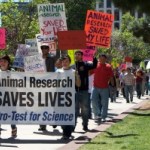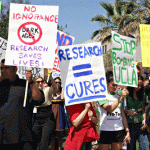animal research
The Southern Poverty Law Center just published an article on an interview they did with an animal liberation freak, Camille Marino (you remember her).
There isnt really anything I feel I need to say about it.
I think Marino says it all.
Marino thinks so too. After the article was published, she wanted it pulled:
Marino was fully aware during the interview that she was talking with a blogger from the Southern Poverty Law Center, even volunteering that she is familiar with the SPLC's history of denouncing radical animal rights activists like the Animal Liberation Front (ALF). She approved a…
Hey. Hey you all remember a while back, when some climate change denialists hacked into someones email, and released all these 'damning' statements on how climate change is all a lie. Except, its not.
You know how climate change denialists are normally crazy right wing Christian/Libertarian dipshits?
Apparently, crazy left wing hippy freaks arent above doing the exact same thing.
A while back, some monkeys at a breeding facility (provide the primates for research) got into a fight. So pics were taken, everything was documented-- the vets got experience dealing with these situations, the…
Today Americans for Medical Progress has announced two recipients for academic year 2010-2011 of the Michael D. Hayre Fellowship in Public Outreach, designed to inspire and motivate the next generation of research advocates. This year, I'm especially wowed by their project.
From the AMP press release:
Two Ph.D. candidates in neuroscience have been selected by Americans for Medical Progress as the 2010-11 Michael D. Hayre Fellows in Public Outreach.  Elizabeth Burnett and Scott Dobrin are in the Neuroscience Program at Wake Forest University School of Medicine in Winston-Salem,…
Dr. Free-Ride: What was it we were going to talk about today?
Elder offspring: The axolotl.
Dr. Free-Ride: Can you please spell that?
Elder offspring: A-X-O-L-O- ... wait. A-X-O-T-O-L. Wait! A-X-O-L-O-T-O-L. I think.
Dr. Free-Ride: Hmm. I shall do some checking on the spelling. And what is it?
Elder offspring: It's a salamander that has achieved eternal youth!
Dr. Free-Ride: Eternal youth?
Elder offspring: At least, youth for the rest of its life.
Dr. Free-Ride: Um, I guess that's eternal enough for that individual. So what does it mean for a salamander to achieve eternal youth? Does…
I want to apologize for the infrequency of my posting lately. Much of it can be laid at the feet of end-of-term grading, although today I've been occupied with a meeting of scientists at different career stages to which I was invited to speak about some topics I discuss here. (More about that later.) June will have more substantive ethics-y posts, honest!
Indeed, to tide you over, I want to ask for your responses to a case study I wrote for the final exam for my "Ethics in Science" class.
First, the case:
Peter is a graduate student in a laboratory that does a variety of research projects…
Making good ethical choices in the real world is hard, in large part because it requires us to find the best balance in responding to interested parties whose legitimate interests pull in different directions. The situation is further complicated by the fact that as we are trying to make the best ethical decision we can, or evaluating the ethical decision-making of others, we can't help but notice that there is not universal agreement about who counts as a party with legitimate interests that ought to be taken into account, let alone about how to weight the competing interests in the ethical…
Today, the UCLA chapter of Pro-Test held its second rally in support of animal research. With as many as 400 or so supporters in attendance, it looks like it was another great success! Here are a couple of early reports on the event:
Tom Holder of Speaking of Research:
On a beautiful sunny day in Los Angeles, Pro-Test for Science organizers arrived at the junction of Le Conte and Westwood, on the edge of the UCLA campus, with armfuls of placards in support of animal research. Within ten minutes every placard had found a new owner as hundreds of scientists, students and members of the public…
(Click to embiggen)
Tomorrow, April 8, 2010, Pro-Test for Science will be holding its second rally in Los Angeles in support of humanely conducted, ethical animal research and the people who conduct it. Their first rally last April drew approximately 700 people to the streets to support the scientific research that offers hope to patients (both human and veterinary) and their families.
Speaking of Research has details on tomorrow's rally:
This rally, on the UCLA campus seeks to:
Communicate a better understanding of animal research to the public, its importance to medical progress, and…
The UCLA chapter of the pro-science organization Pro-Test has announced its second major rally to show support for science and to stand up against the ongoing campaign of intimidation being waged by animal rights activists. The organization originated in Oxford in 2006 during a streak of particularly nasty actions by animal extremists, and the UCLA chapter held their first rally about a year ago in response to the escalating threats and destruction of property aimed at animal researchers in the US.
The next rally is scheduled to start at 11:30 am, on Thursday, April 8th. It will convene on…
Last month, in response to some truly despicable activities by animal rights zealots, I wrote a series of posts about how animal rights activists target even researchers' children and appear to fetishize violence. This simply continued a string of posts that I've done over the years, the longest (and, in my not-so-humble-opinion, the best) deconstructs a lot of the bad scientific arguments used by animal rights activists to claim that animal research is useless, or nearly so, as well as other arguments made by extremists. One of the key points emphasized in these responses is that, regardless…
In a post last month, I noted that not all (maybe even not many) supporters of animal rights are violent extremists, and that Bruins for Animals is a group committed to the animal rights position that was happy to take a public stand against the use of violence and intimidation to further the cause of animal liberation.
On Wednesday, Kristy Anderson (the co-founder of Bruins for Animals), Ashley Smith (the president), and Jill Ryther (the group's advisor) posted a critical response to my post. In the spirit of continuing dialogue, I'd like to respond to that response.
They write:
AR…
Because there are some conversations you have to have with your kids even if you wish you didn't have to have them:
Dr. Free-Ride: I wanted to talk to you about a situation that has come up for a friend of mine and is a little worrisome. So, you know I went down to UCLA the other week, right?
Younger offspring: Yeah.
Dr. Free-Ride: Do you know what I was there for?
Elder offspring: A conference?
Dr. Free-Ride: Nope, it wasn't a conference. It was an event, a dialogue, where people were discussing scientific research with animals. In particular, some people were discussing why they support…
Earlier this week on Adventures in Ethics and Science, Dr. Free-Ride reported that a UCLA researcher faces renewed harassment from animal rights activists for talking about his work. Dr. Dario Ringach and his family have been the subject of invasive physical and personal attacks, and Dr. Free-Ride too has now been targeted by the "militant" animal rights group Negotiation is Over. Scicurious on Neurotopia decries these threatening tactics, writing "we shouldn't have to do our work in fear of threats, intimidation, and severe bodily harm." On Good Math, Bad Math Mark Chu-Carroll adds "animal…
I take it that a good number of animal rights supporters feel that their position is philosophically well-grounded, intuitively appealing, and compatible with the flourishing of humans as well as of non-human animals.
As such, I would argue that animal rights supporters can, and should, advance their position without resorting to tactics that depend on harassment, intimidation, or violence. (At least some animal rights supporters agree.) Especially since the hope is to win the hearts and minds of the larger public to the cause of animal rights, supporters of this position might want to hold…
Earlier this week, I related a situation I found alarming in which a scientist and his children were targeted for harassment because he dared to express the view that research with animals plays an important role in answering scientific questions that matter to scientists and to the public. I was not alone in decrying these tactics. At least one animal rights group also condemned them.
Given that the post was pretty clearly directed at the question of tactics, I am frankly puzzled by this comment from Douglas Watts:
When I see mainstream "science" commit itself to a program which phases…
We don't have to agree about whether animal research is ethical or scientifically valuable to agree that some tactics for pursuing your view are harmful to civil society.
Bruins for Animals, the student organization at UCLA that was instrumental in organizing the recent dialogue about the science and ethics of animal based research, understands this, and they are not afraid to call out the people "on their side" who opt for threats and intimidation:
Joint Statement by Bruins for Animals and Pro-Test for Science
In an effort to establish a dialogue between those holding different opinions on…
When I told you about the infuriating tactics extreme animal rights activists are turning against Dario Ringach for even daring to express his view that animal research can be important, a number of you asked in the comments, "What can we do besides signing petitions and writing blog posts?"
David Jentsch offers some concrete ideas about where to start making your stand:
For those that support research or researchers, I offer a number of possibilities that will allow you to become involved in this struggle:
1) Participate however you can in supporting science and scientists. This may…
I don't write much about the antics of animal rights activists these days, because while some of their activities have a very negative impact on the work of some scientists, they're really just a marginal--albeit highly vocal--bloc that thrives on attention. Still, sometimes they need to be called out, and Janet of Adventures in Ethics and Science is doing just that:
Harassment drove UCLA neurobiologist Dario Ringach out of primate research in 2006. This was not just angry phone calls and email messages. We're talking about people in masks banging on the windows of his house in the night,…
I need to share with you a situation that is infuriating.
It's infuriating to me, and I believe it should be infuriating to anyone who values a civil society worth the name.
Harassment drove UCLA neurobiologist Dario Ringach out of primate research in 2006. This was not just angry phone calls and email messages. We're talking about people in masks banging on the windows of his house in the night, scaring his kids. Without support on this front from other scientists or from UCLA, Dario abandoned research that he believed to be important so that he could keep his family safe.
Since then,…
As promised, here's the video of the February 16, 2010 panel discussion at UCLA about the science and ethics of animal-based research, sponsored by Bruins for Animals and Pro-Test for Science.
UCLA Panel on Science and Ethics of Animal Research from Dario Ringach on Vimeo.
The video runs for about 2.5 hours, so you might want to grab a glass of water or a cup of coffee before you launch it.

